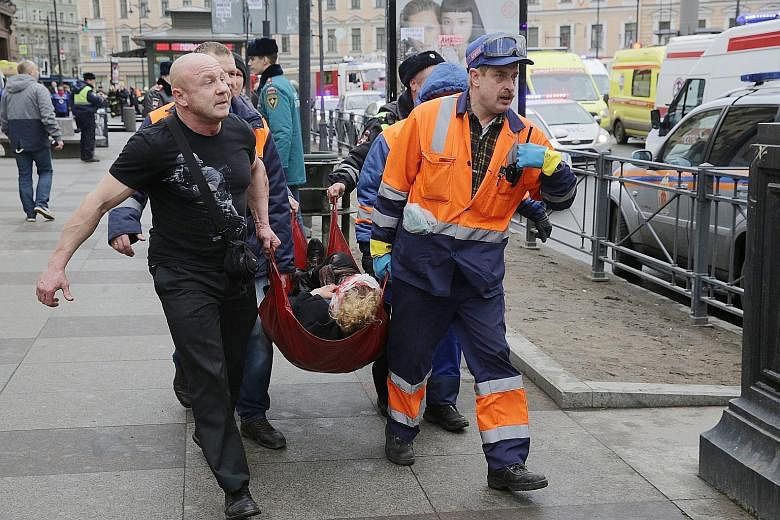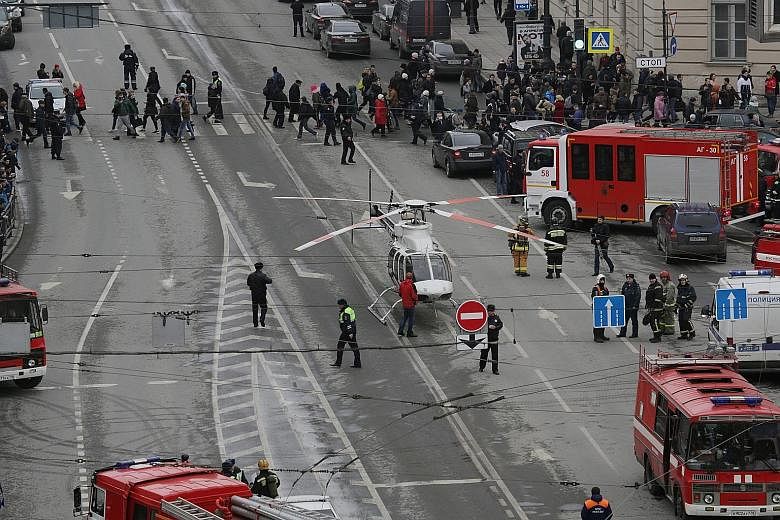MOSCOW • An explosion rocked a subway train in the centre of St Petersburg, Russia's second-largest city, killing at least nine people and injuring more than 20, in what may have been a terrorist attack, the authorities said.
An improvised bomb filled with shrapnel detonated inside a train that was travelling between the Sennaya Square and Technology Institute stations in the city centre at around 2.40pm yesterday (7.40pm Singapore time), said the National Anti-Terror Committee, the government's top law-enforcement body for terrorism.
State TV footage showed a train carriage door torn open, with bloodied and dazed passengers lying on the platform as smoke billowed.
The bomb appeared to have been left in the train, not detonated by a suicide bomber, Interfax reported.
The two stations are on the No. 2 subway line, which runs north-south through St Petersburg. Both of the stations are transfer points with other subway lines.
The blast caused scenes of confusion, with traffic blocked on Moskovsky Prospect, a busy throughfare, and emergency vehicles rushing to the station.
Russian security agencies also found an explosive device at the Ploshchad Vosstaniya metro station, a different location from where the blast earlier took place, and neutralised it, the National Anti-Terrorist Committee said.
The committee added that nine people were killed and more than 20 injured in the blast. The entire subway network was closed after the attack as security was stepped up across the city of five million. In Moscow, city officials also tightened controls across its subway network.
President Vladimir Putin, who was in St Petersburg yesterday for events, including a summit with his Belarussian counterpart Alexander Lukashenko, said it was premature to speak about potential causes of the explosion, noting that terrorism was a possibility.
Other officials were more categorical. "All the signs of a terrorist attack are there," Mr Viktor Ozerov, head of the security committee in the Upper House of Parliament, said by telephone. "The complex of measures against terrorism in the country failed."
No group has taken responsibility for the latest blast.
The Telegraph, citing local news agency RBC, reported that a man allegedly received a text message from a friend on the train who said: "There was an explosion on the track, a guy left his briefcase on the train car, exited the car, and moved to another train car. Just one car."
Surveillance cameras in St Petersburg's metro system may have captured images of the person suspected of organising the attack, Interfax quoted a source as saying.
Russia suffered a number of deadly terrorist attacks in the early part of this century but they have become less frequent in recent years, especially in major cities.
In 2010, Moscow's subway was targeted by suicide bombers who killed 40 people in coordinated attacks.
The last major attacks took place in December 2013, just weeks before the start of the Sochi Winter Olympics, when suicide bombers killed more than 30 people with bombs detonated at a train station and on a bus in Volgograd.
The Islamic State in Iraq and Syria has repeatedly threatened to stage attacks in Russia in revenge for the Russian bombing in Syria that started in September 2015.
Russian-speaking militants make up the largest foreign contingent fighting on behalf of the fundamentalist Sunni group in Syria, sparking fears they could spread terrorist violence if they return to Russia.
BLOOMBERG, NYTIMES, REUTERS



